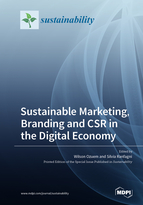Sustainable Marketing, Branding and CSR in the Digital Economy
A special issue of Sustainability (ISSN 2071-1050).
Deadline for manuscript submissions: closed (30 June 2021) | Viewed by 41057
Special Issue Editors
Interests: marketing communication; marketing; social mapping; advertising; social media marketing; integrated marketing communication; branding; internet marketing; digital marketing; interactive marketing
Special Issue Information
Dear Colleagues,
Sustainable marketing practice is essential for developing a more comprehensive understanding of consumers’ purchase decisions in dynamic digital marketing environments. Scholars and practitioners conceive sustainable marketing practices as an episodic fashion, predicated on temporal practices in response to the emerging digital environments. Consumers are increasingly becoming aware of the ecological issues that their consumption creates in the marketplace. Despite the importance of sustainable practices, when and how sustainability occurs within the consumer purchase decision remains largely unexplored. In part, this is because the practices of sustainability in the emerging computer-mediated marketing environments (CMMEs) are difficult to anticipate and study. Much of what we know about sustainable marketing practice is mainly focused on customer–brand relationships. Prior literature examining sustainable marketing practice through CMMEs remains sparse, despite consistent emphasis on the benefits of sustainable marketing practices in the emerging digital world. Our Special Issue will consider abstracts/papers on the following topics, though these are not mutually exclusive; potential papers on related themes may be considered.
Prof. Wilson Ozuem
Prof. Silvia Ranfagni
Guest Editors
Manuscript Submission Information
Manuscripts should be submitted online at www.mdpi.com by registering and logging in to this website. Once you are registered, click here to go to the submission form. Manuscripts can be submitted until the deadline. All submissions that pass pre-check are peer-reviewed. Accepted papers will be published continuously in the journal (as soon as accepted) and will be listed together on the special issue website. Research articles, review articles as well as short communications are invited. For planned papers, a title and short abstract (about 100 words) can be sent to the Editorial Office for announcement on this website.
Submitted manuscripts should not have been published previously, nor be under consideration for publication elsewhere (except conference proceedings papers). All manuscripts are thoroughly refereed through a single-blind peer-review process. A guide for authors and other relevant information for submission of manuscripts is available on the Instructions for Authors page. Sustainability is an international peer-reviewed open access semimonthly journal published by MDPI.
Please visit the Instructions for Authors page before submitting a manuscript. The Article Processing Charge (APC) for publication in this open access journal is 2400 CHF (Swiss Francs). Submitted papers should be well formatted and use good English. Authors may use MDPI's English editing service prior to publication or during author revisions.
Keywords
- Sustainable marketing in the digital era
- Digital marketing and sustainable marketing
- Sustainability and online brand communities
- Influencer marketing and sustainability
- Social media strategies and sustainability
- Netnography and user-generated content (UGC) as basis to investigate sustainability
- Videography as basis to investigate sustainability in social networks
- Sustainable brands and virtual settings
- Sustainable brands and e-commerce
- Innovation in channel distribution and sustainability
- Big data and sustainability
- Emerging technologies and sustainable marketing
- Corporate social responsibility and sustainability
- Social influence theory






